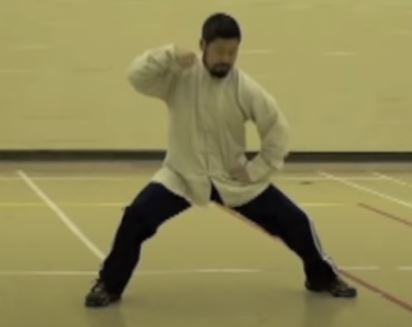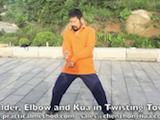It was cold, wet and grey when I arrived on Daqingshan in May. Under my cold, cold breath I cussed Singapore friends who told me to pack short-sleeve tees. And oh, the stairs! Stairs to Wangting hotel, stairs to Changxing training hall, and more stairs to the condo. Surely the three weeks of training ahead would drag on.
So why am I now missing the Big Green Mountain? It’s not the piping-hot plates of fresh vegetables. It’s not the winding forest paths and hammocks under the trees. It’s the people up on the mountain that made my Taiji journey to 大青山 so special.
Firstly, Master Chen Zhonghua. I do not see him at first. His frame is surprisingly small and compact. I finally spot him because of the small crowd that he always attracts, like some inevitable magnetic pull. His beard gives him a sagely air, but he is friendly, charming and speaks perfect English. After all, he has a Masters in linguistics.
Mostly, I remember his eyes: They twinkle when he’s telling a funny story at mealtimes; they narrow with focus when he’s watching your yilu movements; and they open wide to stare intently at students he’s telling off. He can be very stern when he cautions students not to add embellishments to his teacher’s teachings. But that doesn’t happen often.
Mostly, his teaching method is very hands-on. Don’t expect a walled-in classroom schedule. The tutorial is wherever he happens to be. Walking around, he will place his hand on your shoulder. ‘Don’t move this, and this, and this.’ Huh? Very soon, you realise his elasticity comes from decades of practice. To demonstrate a principle, Master Chen always invites students to push him. It’s actually very funny to see people toppling when he tilts one or two fingers just so.
He is a consummate story-teller and his classrooms are never boring. He zooms in and out of topics like a camera with an auto-focus lens. Micro to macro and back again. Once, a student asks if it is too late for older students to learn Practical Method since some techniques need such long years of training. In reply, Master Chen recounts a poignant episode from the last days of his teacher Hong Junsheng. You realise he’s saying that it’s never too late. And sometimes, perhaps, time is irrelevant.
The Daqingshan project is huge, with hotels and upcoming conference facilities and a bigger Taiji school. It is a contradiction, a commercial enterprise born of necessity, and yet also a spiritual enterprise – a physical embodiment of Master Chen’s deep loyalty to his teacher, as his international standard bearer. Soon I come to my own conclusion that it isn’t about commerce. It is about connecting Practical Method to the rest of the world.
The local Daqingshan team is a bunch of 6 to 10 loyal stalwarts. Man, they are tough. They rise early to lead classes at 5:30 am. To my horror, in the first week they plough through 7 yilu each morning, 6 more than I was expecting! After each morning’s workout, they then put in a full day’s work onsite because construction on Daqingshan is still very much a work in progess.
 Chen Xu leads the troop and is like an older brother; Han Rui likes to improve his English with the international students; Chu is popular with newcomers for doing a slo-mo yilu in 10 minutes, while most others zip through in 5; handsome Zi Li turns up everywhere with a ready smile and his videocam; Xiao Shao is the strong silent one, and he is the driver that picks me up from the airport.
Chen Xu leads the troop and is like an older brother; Han Rui likes to improve his English with the international students; Chu is popular with newcomers for doing a slo-mo yilu in 10 minutes, while most others zip through in 5; handsome Zi Li turns up everywhere with a ready smile and his videocam; Xiao Shao is the strong silent one, and he is the driver that picks me up from the airport.
On the mountain, It’s Taiji all-day, every day. When the boys are busy with work, you are free to practise with other senior students. By 4 pm, Chen Xu is there again to lead the training. The afternoon quota is often 10 yilu! At night, if your knees haven’t given way, you can literally try your hand at push hands from 8 to 10 pm. Those of us with weak hearts and still weaker knees retire to practise yilu in the small Taiji square till late.
International students come and go during the 3 weeks I am there, and some bring extraordinary skills. I have a soft spot for Gilbert, 75, from Hawaii who can sing a pretty tune on his ukelele. This hardy senior is no pushover (you know it the minute you engage him during push hands) and he leaps up stairs two at a time, leaving me far behind. And you know that mealtimes will be a laugh a minute when Renaat from Belgium sits next to you.
I still text John from Australia and Pawel from Austria because they are just the kind of guys everyone calls friend. Lissome Lilia from Germany not only performs a fire dance that takes your breath away, she also plays the guzhen, a Chinese instrument that sounds like a cello. Surely it’s unfair for so much talent to reside in such a beautiful body.
Under the scalding midday sun, it’s oddly reassuring to find Tomac from Czech Republic completing his yilu quota for the day. He often tries to bully us into action with ‘What! Is this a HOLIDAY?’ Ben and Nathan from America are also on the square, always after a few cups of Chinese tea, freshly brewed if you please. May Chen from Singapore is learning the broadsword from Gino of Canada. Janet from Australia knows how to work a tank top, but no worries, mate, her shutterbug dad is hovering nearby.
And then there is Tim Duehring, major domo on the mountain, Mr Fix-it, a lovable Santa Claus-type guy that locals call ‘ye ye’ or grandpa. He is unflappable and, I am to find out, an exceptional teacher in his own right.
On my last evening at Daqingshan, I take a moment to be still. Everywhere on the small square, someone is learning Taiji, doing Taiji or talking Taiji. How fine that is. I review the kaleidoscope of Daqingshan happenings – yilus in the mist, challenges from strangers, buddy treks up the mountain looking for goats.
Just two months back, I remember Michael Koh and others from Singapore who encouraged me to give it a try. So many reasons to say no: ‘I don’t know Practical Method; I don’t know yilu yet; and I don’t know Master Chen.’ Well, recently I read a book titled ‘what makes your brain happy and why you should do the opposite’ by David DiSalvo.
So I took off to China, learnt Practical Method yilu, and even talked myself into taking part in the Daqingshan international competition, my very first! That is another (short) story.
I’ve been home for more than a week and it’s hard to maintain yilu practice. How precious it is, that pocket of time on Daqingshan. It remains bracketed, apart from my busy daily schedule. So I dip into it every now and then, to recall some teaching from Master Chen (‘Don’t move!’) or some student’s face. I know that the only unchangeable thing is change. That is the Dao. But I hope come May next year, I’ll be up at 5:30 on a misty morning doing yilu on a mountain in Shandong. You should come too …




{ 4 comments… read them below or add one }
Marjorie, what a great article describing the life on the mountain! I enjoyed it very much.
Marjorie, Lovely article describing the feelings so well.
As always the writer in you springs forth like the water in the well where locals gather the purity of Daqingshan energy to replenish their thirsty souls.. Zai jian from the humuhumunukunukuapuaa from Hawaii
Marjorie, you’re writing is a joy to read!
I also look forward to my 5:30 Yilu next year! It is almost impossible to do anywhere else!!!